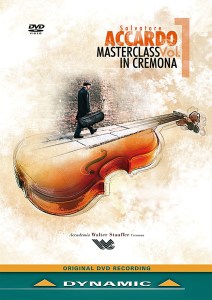In these two roughly 36-minute master classes Salvatore Accardo is
shown giving instruction to two young Italian fiddle players. The location
is the Accademia Walter Stauffer in Cremona, and the practice room is by no
means luxurious. One of the pleasures is to observe the green Venetian (or
Cremonese) blinds, shut to keep out the sun, and the various stains on the
walls. No wood panelled splendour here, and all the better for it, one
feels. This is practical instruction, not playing for the camera.
Laura Marzadori goes through Beethoven’s Op.12 sonata in E
flat major, or parts of it. Accardo, dressed casually in an open-necked blue
shirt, balding now, listens intently without taking notes. But he recalls
everything, and when they go back over the music, the analysis starts.
Firstly, standing by her, he corrects her galloping triplets (put your
subtitles on if you’re an Anglophone, or are Japanese, Chinese or
Korean) and corrects her up and down bow decisions. He lengthens her
chording, gets to grips with her rhythm. Then he begins an interesting
conversation about ensemble problems, with Accardo advising the violinist to
watch the right hand of the pianist at one structurally important and
perilous point - the pianist in this case being the hard-working Maria
Grazia Bellocchio. He even corrects the rushing pianist too. He confesses
that Marzadori makes him nervous when she rushes toward the frog in one
especially perilous bowing moment. Occasionally he explains by showing her
on his violin how he’d prefer things were done, but these are
collegiate meetings of musical minds, and he is not doctrinaire or dogmatic.
Practical advice is dispensed and good musical sense, but there’s no
question of blindly following. He prefers certain fingerings for reasons of
expressiveness, and the use of a full bow. But he’s prepared to be
befuddled at one or two points and the class is conducted in a relaxed, hard
working but human way. At the end the pianist turns to him and says ‘I
have an idea!’ Accardo pauses fractionally. ‘Ah, Dio’ he
deadpans. A great way to end.
The avuncular but down to earth Accardo works on Lucia Luque’s
Carmen Fantasy, once again with Maria Grazia Bellocchio. Here one finds more
of a concentration on phrasing, articulation but again, tempo. He is very
against rushing. He is clear that neither musician should ‘set each
other off’ which one notices they are prone to do. The exchange over
the pizzicato paragraph produces some interesting results: left or right
hand pizzicati is the question? The answer concerns colour and articulation.
‘It changes everything’ Accardo says simply. Luque is the more
extrovert of the two violinists, and the more unselfconscious, cracking a
few good gags. She asks whether she can use a glissando at one point,
admitting that she takes liberties sometimes. ‘It’s
easier’ grins Accardo and the complicity between the two is
delightful. He gets into more detail with her over phrasing
(‘dolce’) and shows her how to stop going wrong when she plays
harmonics; a simple but clearly effective solution - use the upper part of
the bow and nowhere near the frog and not too much bow either.
These two classes last 72 minutes in total. They make for functional
watching with nothing fancy to detain one from the music-making itself.
That, in essence, is Accardo’s way too: direct, helpful, courteous,
unflappable, practical, amused and amusing. Master class DVDs have a niche
market and this one has no ancillary stuff, but for those who want to watch
and learn from a great, unassuming musician, this one is succinctly
efficient.
Jonathan Woolf
Support us financially by purchasing this disc from:
|
|
|
|
|
|
|


















 [72:00]
[72:00] 